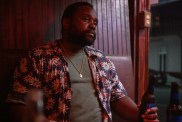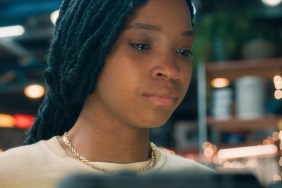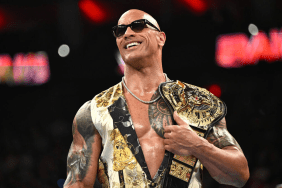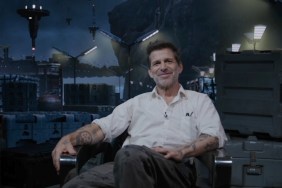Fortunately, director Alex Gibney (The Trials of Henry Kissinger) has put together an entertaining and informative documentary called Enron: The Smartest Guys in the Room, which breaks down the rise and fall of this multi-million dollar corporation in easy to digest sections. Based on the bestselling book of the same name by Bethany McLean and Peter Elkin, it includes enlightening interviews with traders and execs of the company, who couldn’t see the impending death of the company coming despite the questionable decisions being made.
McLean’s involvement in the Enron story is particularly interesting, since she first raised questions with an article she wrote about the company for Fortune magazine. A few months later, Enron’s CEO Jeff Skilling would resign, and the stock would drop drastically, leading to major layoffs as the company filed for bankruptcy. It was then learned that Skilling and Enron founder Ken Lay made large profits selling their stocks before the crash, leaving a lot of shareholders and employees high and dry. This lead to a government inquiry on Enron’s business practices, much of which is shown in the film via footage from CSPAN.
The thought that one of the 7th largest companies in the world could fall so far so fast is quite astounding, and it’s a subject that director Alex Gibney recently discussed with ComingSoon.net.
CS!: What originally spurred you to tell the Enron story in a documentary?
Gibney: The book had already come out, and that was the reason I decided to make the movie. Kerry Welch at Fortune magazine handed me a copy of the book and said that I might be interested in it. After I read the book, I realized it wasn’t a story about numbers; it was a story about people. It was fundamentally a human tragedy, but there was also a tone in it that I liked very much, where it was sort of a black comedy. Things were funny, but it has an undercurrent tone of moral outrage. The fascinating aspect of these characters–these sorts of geeks to macho men–and the greek tragedy sense of hubris that these people, like Icarus, flew far too close to the sun.
CS!: Can you talk a bit about how you took the information from the book and structured it into a film?
Gibney: The key thing was figuring out which characters we were going to follow. In terms of the structure of a documentary, you have to listen or watch the film and it speaks to you finally, and tells you how to structure the story. Ultimately, we almost structured it like a heist film. And that helped us focus the narrative, but in addition, it was very much dependent on the kinds of people we talked to and the kinds of material we uncovered. The California section is much longer in our film than Peter and Bethany’s book, in part because we found those extraordinary audio tapes of the California traders, and there was something about that that really gave us a peek inside this neo-Darwinian world that Jeff Skilley imagined.

Gibney: My research process started with the book and then continued onwards. I would say that the research process continued throughout the production of the film right up until the end. In fact, some of our key interviews weren’t conducted until very late in the game and then we had to completely restructure the film.
CS!: Since the Senate hearings were taking place, were you able to get some help from the government or justice department in getting material for the movie like the tapes of the Enron traders laughing about the rolling blackouts in California?
Gibney: The Department of Justice was absolutely no help to us. It took a lot of work to get those archival materials, and in making a film like this, it’s the only way you can do it is to find those unofficial materials. We had some help from House and Senate investigators, but we also had a lot of help from a lot of angry employees. In the case of the audiotapes, there’s a very interesting story behind that. Enron, in Chapter 11, was suing a small public utility in Washington State, the Snohomish Public Utility District, for non-payment of their electrical bill. The Snohomish District said “Wait, a minute. You were gouging us for years, and now you’re suing us because we didn’t pay our electricity bill?” So Snohomish did something very interesting; it was a real David and Goliath maneuver. Through a series of legal maneuvers, they were able to obtain these trader tapes, which are recorded for commercial purposes in order to verify trades, from the FBI. They went through thousands of hours of those tapes using kids and other volunteers. Sure enough, they discovered what many people thought had happened but nobody could prove, which was an actual gaming of the California [electricity] market [by Enron]. When you’re making a film, you can’t really use description or words to fill in the background, you have to have the stuff. That was the stuff. It gave us a sense of what to point toward in terms of the overall narrative of the film.
CS!: Did you have any problems getting people to talk on camera about some of the things going on inside the company?
Gibney: It was very hard to get anybody to talk because of the amount of legal proceedings, both civil and criminal. The fact was if you pop up above the radar and somebody wants to depose you, that can cost you up to $40,000. That’s an expensive interview. I think a lot of people were reluctant, but for a variety of reasons, people came forward. Many people I talked to off-camera were burning to tell their stories or to talk about it because it was an important and very difficult experience for them. Getting them to talk on camera was a real challenge. In one case, Ken Lay helped us by appearing on Larry King. One person, who I had been pursuing for two months, got so enraged that he called me up and agreed to talk to me.
CS!: Do you think that documentary filmmakers these days may be doing what the media and journalists should be doing, as far as asking questions and finding answers to situations like the Enron one?
Gibney: Documentaries seem to be occupying that territory that used to be the responsibility of both TV and print, in terms of actually asking the tough, provocative questions rather than achieving a phony balance and presenting the view of people in power. Part of what the press should do is to ask tough questions that citizens can’t answer on a regular basis. That’s what a democracy is all about and the press has an obligation. Actually, I think that many journalists want to ask those questions, but more and more, the outlets have become so concerned about commercial considerations, particularly with the rise of FOX News, they don’t want to offend anybody. There’s a reluctance to be tougher.
CS!: Of course, one could say that Bethany McLean’s article for Fortune Magazine started the ball rolling on people questioning Enron’s business practices.
Gibney: Fortune Magazine, which was very much an enabler for Enron’s rise, also became the vehicle for Enron’s fall. In that case, Fortune Magazine did the job of the Fourth Estate as properly conceived. The documentarians aren’t the only ones doing it. It’s just an interesting phenomenon, particularly on TV, where the role of the old documentaries seems to have disappeared from TV. There’s such a need to create profits and so much attention has to be paid to the bottom line, that the desire to do these riskier and hard hitting exposes and “ask why” exercises is more limited. But look, there are a lot of great journalists doing interesting work.

Gibney: Look what happened in the wake of that Dan Rather report. Largely speaking, they were right on the overall story. There was a question and having read the report, it’s not even very clear those were false documents. People were split on that score, but they cleaned house as the result of that. You have to ask yourself what was the reason for that? Was that an economic reason in order to show their more conservative viewers that this stuff won’t be tolerated, and therefore, they should come back to CBS?
CS!: Ultimately, what do you think caused the fall of Enron? Was it just a few bad apples running the company?
Gibney: I think the lesson is that this is not a case of a few bad apples. A lot of people who are supposed to say “no” didn’t say “no”. Even more than that, I think it was a case of synergistic corruption, because Enron couldn’t have done what it had done without the lax oversight of the regulators, without the help of the investment banks and what was once our largest and most prestigious accounting firm, and without the help of a battery of corporate lawyers. It was a bigger issue. Indeed, they couldn’t have done what they did in California without the help of a lot of other companies. Enron is not an anomaly. I think it’s the exaggeration of the rule rather than the exception to it.
CS!: Finally, what do you think is the most important lesson that we can learn from Enron?
Gibney: In the wake of Enron, a number of laws had been enacted, which now makes it more difficult for chief executives to claim that they had no responsibility or didn’t know what was going on. They have to sign off on things in a way that they didn’t have to before. Some executives now feel that the pendulum has swung too far in the opposite direction. I’m not sure that it’s swung that far. What people may have learned from Enron, I hope, is embodied in what the young trader says at the end when he flips Enron’s corporate slogan on its head. The slogan for Enron was “Ask Why”, and I think the Enron debacle teaches us to ask why.
Enron: The Smartest Guys in the Room opens in New York, Los Angeles and Houston on Friday.









